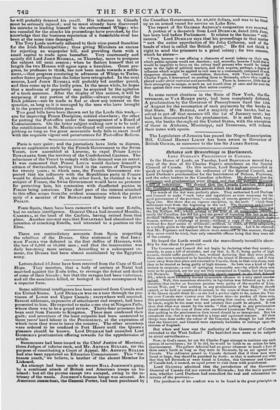Some additional intelligence has been received from Canada and the
United States. Lord DURHAM was on a tour through the pro- vinces of Lower and Upper Canada ; everywhere well received. Several addresses, expressive of attachment and respect, had been presented to him. He expected to make some stay at Niagara Falls, where there was to be a grand review. Thirty-four prisoners had been sent from Toronto to Kingston. These men confessed their guilt; and seventeen of the least culpable had been sentenced to three yeers' hard labour in the Penitentiary, at the expiration of which term they were to leave the country. The other seventeen were ordered to be confined in Fort Henry until the Queen's pleasure should be known. Lord DURHAM had annulled Lord Gosecnto's proclamation offering rewards for the apprehension of rebels.
Summonses had been issued to the Chief Justice of Montreal, three Judges of inferior rank, and Mr. ARTHUR BULLER, for the purpose of constituting a Court of Appeal. Mr. ARTHUR BULLER had also been appointed an Education Commissioner. This "for- tunate youth," we believe, is brother of the absent Member for Liskeard.
An attempt had been made to secure BILL JOHNSON'S gang, by a combined attack of British and American troops on his island: but all the pirates except two escaped, owing to the in- tricacy of the woods. JOHNSON'S famous barge was secured. An American steaux-boat, the General Porter, bad been purchased by the Canadian Government, for 40,000 dollars, and was to be fitted up as an armed vessel for service on Lake Erie. The report of Sir GEORGE ARTHUR'S resignation was renew
a
A portion of a despatch from Lord DURHAM, dated 29th June, has been laid before Parliament. It relates to the famous " ordi- nances?' Lord DURHAM says that his proceedings in that matter " met the entire approbation of Sir John Colborne, and of the heads of what is called the British party." He did not think it right to send the prisoners to a penal colony ; for two reasons, which he states— "First, because it was affixing a character of moral infamy on their acts, which public opinion would not sanction ; and secondly, because I hold that it would be impolitic to force on the colony itself persons who would be looked upon in the light of political martyrs, and thus acquire, perhaps, a degree of influence which might be applied to evil uses in a community composed of such dangerous elements. On consultation, therefore, with Vice-Admiral Sir Charles Paget, I determined on sending them to Bermuda, where they could be placed under strict restraint and surveillance. There is, however, little fear of their attempting to escape, as such an act would close at once and for ever the door against their ever reentering their native country."


























 Previous page
Previous page